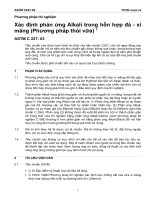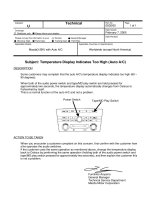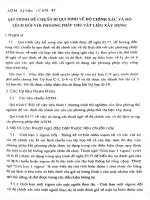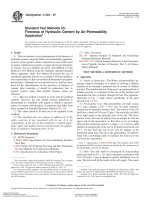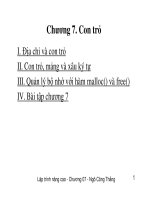Astm c 551 c 551m 07 (2011)e1
Bạn đang xem bản rút gọn của tài liệu. Xem và tải ngay bản đầy đủ của tài liệu tại đây (86.58 KB, 4 trang )
Designation: C551/C551M − 07 (Reapproved 2011)´1
Standard Specification for
Asbestos-Cement Fiberboard Insulating Panels1
This standard is issued under the fixed designation C551/C551M; the number immediately following the designation indicates the year
of original adoption or, in the case of revision, the year of last revision. A number in parentheses indicates the year of last reapproval.
A superscript epsilon (´) indicates an editorial change since the last revision or reapproval.
ε1 NOTE—Units information was editorially corrected in January 2012.
2. Referenced Documents
1. Scope
2.1 ASTM Standards:3
C150 Specification for Portland Cement
C208 Specification for Cellulosic Fiber Insulating Board
C220 Specification for Flat Asbestos-Cement Sheets
C236 Test Method for Steady-State Thermal Performance of
Building Assemblies by Means of a Guarded Hot Box
(Withdrawn 2001)4
C458 Test Method for Organic Fiber Content of AsbestosCement Products
C518 Test Method for Steady-State Thermal Transmission
Properties by Means of the Heat Flow Meter Apparatus
C595 Specification for Blended Hydraulic Cements
C618 Specification for Coal Fly Ash and Raw or Calcined
Natural Pozzolan for Use in Concrete
D2946 Terminology for Asbestos and Asbestos–Cement
Products
E96/E96M Test Methods for Water Vapor Transmission of
Materials
1.1 This specification covers asbestos-cement insulating
panels consisting of a core of insulating fiber board sandwiched
between, and bonded to, two sheets of asbestos-cement facing
board. Asbestos-cement insulating panels are designed for
exterior and interior walls, partitions, curtain walls, roof decks,
and for decorative purposes.
1.2 All measurements and tests necessary for determining
the conformity of asbestos-cement insulating panels with this
specification are made in accordance with the methods covered
in Section 9.
1.3 The values stated in either SI units or inch-pound units
are to be regarded separately as standard. The values stated in
each system may not be exact equivalents; therefore, each
system shall be used independently of the other. Combining
values from the two systems may result in non-conformance
with the standard.
1.4 Warning—Breathing of asbestos dust is hazardous.
Asbestos and asbestos products present demonstrated health
risks for users and for those with whom they come into contact.
In addition to other precautions, when working with asbestoscement products, minimize the dust that results. For information on the safe use of chrysoltile asbestos, refer to “Safe Use
of Chrysotile Asbestos: A Manual on Preventive and Control
Measures.”2
1.5 The following safety hazards caveat pertains only to the
test method portion, Section 9, of this specification. This
standard does not purport to address all of the safety concerns,
if any, associated with its use. It is the responsibility of the user
of this standard to establish appropriate safety and health
practices and determine the applicability of regulatory limitations prior to use. See for a specific hazard warning.
2.2 Federal Standard:
Fed. Std. No. 123 Marking for Shipment (Civil Agencies)5
2.3 Military Standard:
MIL-STD-129 Marking for Shipment and Storage5
2.4 Other Standards:
Uniform Freight Classification Rules6
National Motor Freight Classification Rules7
3. Terminology
3.1 Definitions:
3
For referenced ASTM standards, visit the ASTM website, www.astm.org, or
contact ASTM Customer Service at For Annual Book of ASTM
Standards volume information, refer to the standard’s Document Summary page on
the ASTM website.
4
The last approved version of this historical standard is referenced on
www.astm.org.
5
Available from Standardization Documents, Order Desk, Bldg. 4, Section D,
700 Robbins Ave., Philadelphia, PA 19111-5094.
6
Available from the Uniform Classification Commission, Room 1106, 222 S.
Riverside Plaza, Chicago, IL 60606.
7
Available from National Motor Freight Inc., 1616 “P” St. NW, Washington, DC
20036.
1
This specification is under the jurisdiction of ASTM Committee C17 on
Fiber-Reinforced Cement Products and is the direct responsibility of Subcommittee
C17.03 on Asbestos - Cement Sheet Products and Accessories.
Current edition approved Nov. 1, 2011. Published January 2012. Originally
approved in 1964. Last previous edition approved in 2007 as C551 – 07. DOI:
10.1520/C0551_C0551M-07R11E01.
2
Available from The Asbestos Institute, />manual.htm.
Copyright © ASTM International, 100 Barr Harbor Drive, PO Box C700, West Conshohocken, PA 19428-2959. United States
1
C551/C551M − 07 (2011)´1
3.1.1 dimensions—for the purpose of this specification,
include the length, width, thickness, and squareness (defined
hereunder) of asbestos-cement insulating panels as measured
under specified conditions.
3.1.2 flexural strength—the average breaking load in newtons per meter of width [or lbf/ft of width] of dried specimens
loaded as simple beams on a 762 mm [30 in.] span with the
load applied equally and simultaneously at both one-third
points of the span.
TABLE 1 Flexural Strength Requirements for Panels
NOTE 1—The flexural performance is defined as the moment capacity in
N·m/m [or ft·lbf/ft] of width, obtained from the product of flexural
strength and span divided by 6.
5.1.5 Thermal Resistance, R—The average thermal
resistance, R, K·m2/W [deg F·h·ft2/Btu] of the panel shall not
be less than the requirements in Table 2 when tested in
accordance with Test Method C236 or Test Method C518.
5.1.6 Adhesive Line Bond—The glue shall be suitable for
outdoor use and have such adhesion that specimens resist the
shear stress generated during flexural testing with all failures
occurring within the core board and not at any of the glue lines.
Nominal Thickness
3.1.3 lot—shipment, or part thereof, of a quantity of product
of identical type produced during a single production run.
3.1.4 squareness—deviation from squareness is defined as
the percent difference in the length of the two diagonals of a
panel. Panels with perfect squareness have zero difference
between the length of their diagonals.
mm
[in.]
17
29
40
51
[11⁄16 ]
[11⁄8 ]
[19⁄16 ]
[2]
Minimum Breaking Load
N
[lbf]
1300
2700
4000
5300
300
600
900
1200
5.2 Dimensions:
5.2.1 This specification is applicable only for panels of the
dimensions shown in Table 3 and Table 4.
5.2.2 Permissible Variation in Dimensions:
5.2.2.1 Thickness—The average thickness of all panels supplied under this specification shall be as prescribed in Table 4.
The average thickness of any one sheet shall not differ from the
average of all sheets by more than 10 percent.
5.2.2.2 Width and Length—The permissible variation from
the nominal width shall be −3 mm [0.12 in.] and +1.5 mm
[0.06 in.] and, from the nominal length, −3 mm [0.12 in.] and
+1.5 mm [0.06 in.] as measured after 48 h at 25 6 5°C [70 6
10°F] and 50 % relative humidity.
5.2.2.3 Squareness—The deviation from squareness shall
not exceed 0.2 % of width or length.
3.1.5 Additional terminology is presented in Terminology
D2946.
4. Materials and Manufacture
4.1 Asbestos-cement insulating panels shall be composed of
an insulating core sandwiched between, and bonded to, two
facing sheets of asbestos-cement. The insulating core shall be
manufactured from wood, fiber, or other suitable vegetable
fiber, by a felting or molding process, with suitable sizing
material incorporated into the product to render it water
resistant. The material shall be subjected to such drying
temperatures as to effect complete destruction of rot producing
fungi. The asbestos-cement facing boards shall be composed of
a combination of asbestos fiber and portland cement prescribed
in Specification C150, or portland slag or pozzolan cements
meeting Specification C595, with or without the addition of
curing agents or additives meeting Specification C618, waterrepellent substances, mineral fillers, coatings, pigments, or
mineral granules, formed under pressure and cured to meet the
physical requirements of this specification. Sheets may contain
not more than mass percent of non-deleterious organic components as determined by Test Method C458. The bonding
adhesive shall cover essentially 100 % of the bonding surfaces.
6. Supplementary and Finishing Pieces, Accessories
6.1 Fasteners of suitable size and type for securing asbestoscement insulating board to metal or wood supporting members
of all sizes and types shall be furnished when specified. The
fasteners shall be corrosion-resistant and complete information
regarding the supporting structure must be supplied by the
purchaser.
5. Dimensions, Mass, and Permissible Variations
7. Workmanship, Finish, and Appearance
5.1 Physical Requirements:
5.1.1 Asbestos-cement facing sheets shall conform to the
requirements for Type F or U of Specification C220.
5.1.2 The insulating core board shall conform to the requirements for Class C or E of Specification C208.
5.1.3 Flexural Strength—The average breaking load, obtained by loading equally and simultaneously at both one-third
points of the span, for panel specimens dried for 24 h at 70 6
3°C [160 6 5°F] shall not be less than shown in Table 1.
5.1.4 Vapor Permeability—The average vapor permeability
of any panel board thickness shall not exceed 0.35
g/MPa.s.m2 [81 perms, or grains of water vapor per square foot
per hour per inch of water vapor pressure differential) when
tested according to the wet cup method of Test Methods
E96/E96M.
7.1 Workmanship—The surfaces on both sides of the panel
shall be free of major defects that will impair appearance,
erection, use, or serviceability.
7.2 Finish—The surfaces of the panel shall be smooth,
grained, granuled-coated, or otherwise textured.
TABLE 2 Thermal Resistance, R
Nominal Thickness
2
mm
[in.]
17
29
40
51
[11⁄16 ]
[11⁄8 ]
[19⁄16 ]
[2]
R Value at 24°C [70°F]
K.m2/W
[°F.h.ft2/Btu]
0.23
0.44
0.59
0.71
[1.3]
[2.5]
[3.3]
[4.0]
C551/C551M − 07 (2011)´1
TABLE 3 Dimensions
Nominal
Thickness
Nominal Width
mm [in.]
m
[in.]
17
29
40
51
1.2
1.2
1.2
1.2
[48]
[48]
[48]
[48]
[11⁄16 ]
[11⁄8 ]
[19⁄16 ]
[2]
9.2 Flexural Strength:
9.2.1 Definition—Flexural strength, for the purpose of this
specification, is the average breaking load, in newtons [or
pounds-force] of test specimens dried as specified, loaded as
simple beams with the load applied equally and simultaneously
to both one-third points of the span, and tested by the method
prescribed in 12.3.
9.2.2 Significance—This is a routine test method to indicate
the strength of the product.
9.2.3 Procedure—Cut two specimens 70 × 30 cm [30 × 12
in.] from each panel to be tested, with the long dimension of
the samples parallel to the long dimension of the panel. Dry
each specimen for 24 h in a ventilated oven at a temperature of
70 6 3°C [160 6 5°F], then cool to room temperature.
Determine the flexural strength of each specimen by placing
the specimen on supports that cannot exert longitudinal constraint (rocker-type bearing edges or rollers with a 3-mm
[1⁄8-in.] minimum and a 13-mm [1⁄2-in.] maximum radius) and
applying the load equally and simultaneously to both one-third
points of the span through similar edges bearing against either
surface of the specimen. The test span shall be 609.6 6 1.6 mm
[24 6 1⁄16 in.] and the load lines and supports shall be parallel.
Increase the load applied at a uniform rate to produce a failure
of the specimen in 1 to 2 min. The possible error in the load
reading shall not exceed 1 % of the load. Report the flexural
strength as the average load, newtons [or pounds force], for all
the specimens tested.
9.2.3.1 Warning—see .
Nominal Length
m
[ft]
1.8, 2.4, 2.7, 3.0, 3.6
— 2.4 — — 3.6
— 2.4 — — 3.6
1.8, 2.4, 2.7, 3.0, 3.6
[6, 8, 9, 10, 12]
[– 8 – – 12]
[– 8 – – 12]
[6, 8, 9, 10, 12]
TABLE 4 Thickness Requirements
Nominal Thickness
Thickness Limits
minimum
mm
[in.]
17
29
40
51
[11⁄16 ]
[11⁄8 ]
[19⁄16 ]
[2]
mm
16
27
38
49
[in.]
[0.62]
[1.06]
[1.50]
[1.94]
maximum
mm
20
31
42
52
[in.]
[0.81]
[1.22]
[1.66]
[2.06]
7.3 Color—Both surfaces of the panel will be the natural
color of the asbestos-cement products or may be colored by the
addition of mineral pigments, chemical impregnation, pigmented coatings, veneers, or embedded mineral granules.
7.4 Efflorescence—Efflorescence that sometimes may appear on asbestos-cement insulating panels is not a defect and
should not result in a permanent change in color.
8. Rejection and Retesting
8.1 If one of the samples fails to conform to any one of the
requirements of this specification, a second sample from the
same lot shall be prepared and tested. The results of the retest
shall be averaged with the results of the original test to
determine compliance with this specification.
9.3 Vapor Permeability:
9.3.1 Significance—The purpose of this test method is to
obtain, by means of simple apparatus, reliable values in
uniform units of measurement for the rate of water vapor
transmission of insulating and related materials. These values
are for use in design, manufacture, and marketing. Correlation
of test values with any given use must be determined by
experience.
9.3.2 Procedure—Test asbestos-cement insulating panels in
accordance with Test Methods E96/E96M.
8.2 Failure to conform to any one of the requirements of this
specification, upon retest as prescribed above, shall constitute
grounds for rejection. In case of rejection, the seller shall have
the right to reinspect the rejected shipment and resubmit the lot
after removal of the portion of the shipment not conforming to
the specified requirements, provided this is done within 20
days after receipt of written notice of the specific cause for
rejection.
9.4 Thermal Resistance, R:
9.4.1 Significance—The thermal resistance, R, of a panel is
a measure of the time rate heat flow through a unit area of the
panel in a direction perpendicular to the face of the panel, per
unit thickness of the panel, per unit temperature gradient across
the panel.
9.4.2 Procedure—Test asbestos-cement insulating panels in
accordance with Test Method C236. Thermal resistance is
calculated as the reciprocal of thermal conductance.
9. Test Methods
9.1 Sampling:
9.1.1 Select at random a number of panels from each
shipment or lot, representing a product of the same kind. Table
5 shows the number of panels to be selected from shipments of
various quantities.
9.1.2 Additional panels may be taken at the discretion of the
inspector.
9.5 Dimensional Measurements:
9.5.1 Significance of Dimensional Measurements:
9.5.1.1 Significance—These are routine measurements for
the purpose of determining whether the length, width,
thickness, and squareness of the individual units are as ordered,
to ensure that they fit together properly in application, and to
determine the uniformity of the specified thickness.
9.5.2 Thickness—Measure each test specimen for thickness,
using a micrometer caliper having flat anvils approximately 5
mm [0.25 in.] in diameter and reading to 0.02 mm [0.001 in.].
TABLE 5 Sample Panel Selection
Quantity of Panels in a Lot
500
501
1001
1729
2745
4097
5833
and under
to 1000
to 1728
to 2744
to 4096
to 5832
to 8000
Quantity of Panels Selected as Samples
3
5
6
7
8
9
10
3
C551/C551M − 07 (2011)´1
11.2 Commercial Packaging—Asbestos-cement insulating
panels shall be so shipped as to ensure acceptance by common
carriers. There is no standard package. The material is usually
shipped in bulk, but may be crated when so specified by the
purchaser.
Make four measurements on each specimen at the approximate
midpoint of each edge of the specimen, and at least 1 cm [0.5
in.] in from the edge. Record average of the four measurements
and record as the specimen thickness.
10. Inspection
10.1 Inspection of material shall be made at the point of
shipment. The inspector representing the purchaser shall have
free access to the carriers being loaded for shipment to the
purchaser. He shall be afforded all reasonable and available
facilities at the point of shipment for sampling and inspection
of the material, which shall be so conducted as not to interfere
unnecessarily with the loading of the carriers.
11.3 Storage—Asbestos-cement insulating panels should be
piled on sufficiently firm supports that will keep the sheets
level and flat. The sheets shall be piled with the edges square
and flush, and covered to provide protection from the weather
until used.
12. Keywords
11. Packaging and Shipping
11.1 Commercial Quantities—Table 3 lists sizes generally
available commercially.
12.1 asbestos; asbestos-cement; asbestos-cement fiberboard; fiberboard; fiberboard insulating panels; fiberboard
panels; panels
SUPPLEMENTARY REQUIREMENTS
The following supplementary requirements shall apply when material is supplied under this
specification for U.S. Government procurement.
S1. Packaging
S2. Responsibility for Inspection
S1.1 Unless otherwise specified in the contract, the material
shall be packaged in accordance with the producer’s standard
practice which will be acceptable to the carrier at lowest rates.
Containers and packing shall comply with Uniform Freight
Classification Rules or National Motor Freight Classification
Rules. Marking for shipment of such material shall be in
accordance with Fed. Std. No. 123 for civil agencies and
MIL-STD-129 for military agencies.
S2.1 Unless otherwise specified in the contract or purchase
order, the producer is responsible for the testing of all material
to assure compliance with the requirements specified herein.
Except as otherwise specified in the contract or order, the
producer may use his own or any other suitable facilities for the
performance of the inspection and test requirements specified
herein, unless disapproved by the purchaser. The purchaser
shall have the right to perform any of the inspections and tests
set forth in this specification where such inspections are
deemed necessary to assure that material conforms to prescribed requirements.
ASTM International takes no position respecting the validity of any patent rights asserted in connection with any item mentioned
in this standard. Users of this standard are expressly advised that determination of the validity of any such patent rights, and the risk
of infringement of such rights, are entirely their own responsibility.
This standard is subject to revision at any time by the responsible technical committee and must be reviewed every five years and
if not revised, either reapproved or withdrawn. Your comments are invited either for revision of this standard or for additional standards
and should be addressed to ASTM International Headquarters. Your comments will receive careful consideration at a meeting of the
responsible technical committee, which you may attend. If you feel that your comments have not received a fair hearing you should
make your views known to the ASTM Committee on Standards, at the address shown below.
This standard is copyrighted by ASTM International, 100 Barr Harbor Drive, PO Box C700, West Conshohocken, PA 19428-2959,
United States. Individual reprints (single or multiple copies) of this standard may be obtained by contacting ASTM at the above
address or at 610-832-9585 (phone), 610-832-9555 (fax), or (e-mail); or through the ASTM website
(www.astm.org). Permission rights to photocopy the standard may also be secured from the ASTM website (www.astm.org/
COPYRIGHT/).
4




